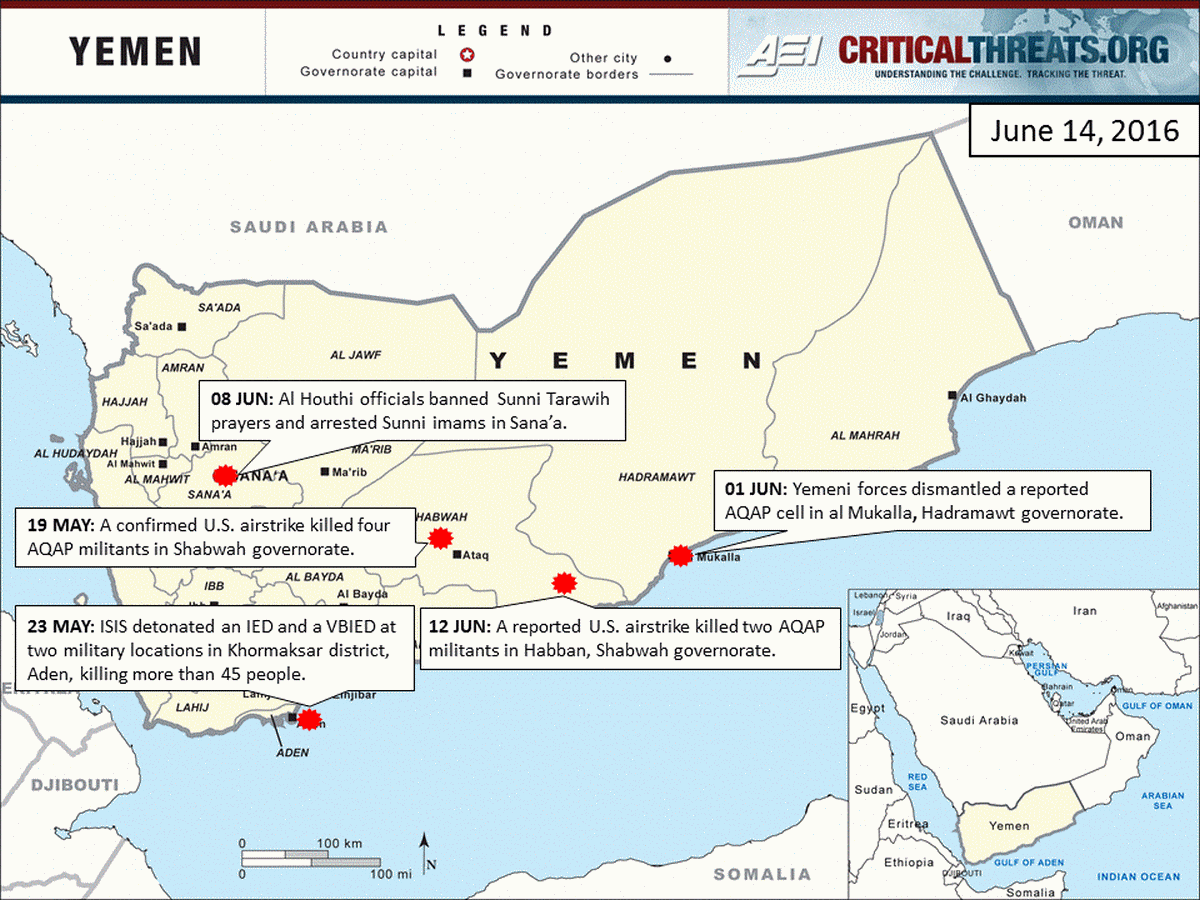The lack of substantive progress in negotiations for a political settlement in Kuwait has created incentives for both the al Houthi-Saleh faction and Saudi-led coalition forces to attempt to change the frontline of the war. The ongoing fighting is preventing the Hadi government from governing effectively in Aden, its de facto capital, which the Islamic State of Iraq and al Sham (ISIS) is exploiting.
ISIS Wilayat Aden-Abyan is prosecuting an explosive attack campaign in Aden to prevent the establishment of President Abdu Rabbu Mansour Hadi’s government in Yemen. The campaign began in October 2015, targeting Yemeni government officials, Saudi-led coalition military bases, and Yemeni security and military recruits. ISIS launched two explosive attacks on May 23 that killed 25 Yemeni military recruits and at least 20 individuals at a military base in Khormaksar district. ISIS Wilayat Aden-Abyan attacks have become more effective even as the frequency declined. The slow in tempo was likely the result of intensive Saudi-led coalition clearing operations in Aden in spring 2016. ISIS Wilayat Aden-Abyan probably planted the two improvised explosive devices (IEDs) that Yemeni security forces found and cleared in mosques in al Mansoura district in Aden on May 27. Al Qaeda in the Arabian Peninsula (AQAP) does not target mosques and other militant groups active in Aden have not previously targeted them either. Aden police, meanwhile, apprehended seven alleged ISIS militants on May 29, including one French national, and subsequently rebuffed an attack on Aden International Airport to rescue the French militant.
AQAP is focused on building its relationship with local Sunni populations, providing pragmatic lines of support. Nayif Saleh Salim al Qaysi, the Hadi-appointed governor of al Bayda and an AQAP member sanctioned by the U.S. Department of Treasury on May 19, is involved in providing support to Yemeni tribal groups fighting the al Houthis in al Bayda governorate. Al Qaysi has also used his political position to facilitate the expansion of AQAP in the area and has financed the group. Ghalib Abdullah al Zaidi, an AQAP commander based in Ma’rib, runs an extensive recruiting network and directs attacks targeting al Houthi positions. AQAP has also taken actions to protect local relationships: The group’s senior leadership retracted a statement warning women and children that AQAP would attack the homes of military commanders in Abyan governorate, explaining that targeting Muslim civilians was anathema to al Qaeda’s doctrine. Counter-AQAP operations are ongoing but have focused on AQAP attack capabilities instead of AQAP’s ability to provide training, weapons, and other forms of support to local militias. Yemeni police forces in al Mukalla dismantled an AQAP bomb-making cell and later found and cleared a vehicle-borne improvised explosive device (VBIED) based on intelligence gleaned from members of the cell. U.S. airstrikes continue to target AQAP militants in Shabwah, Ma’rib, and Hadramawt governorates.
Al Houthi officials have condoned sectarian actions in Sana’a, likely further exacerbating tensions throughout the country. Sectarianism has not historically been present in Yemen despite the country’s demographic make-up (an estimated 40 percent are Zaydi Shi’a and 60 percent are Sunni). Al Houthi officials in Sana’a banned the Tarawih prayer on June 6, a Sunni practice of an additional prayer at night during the Ramadan month. The al Houthis later arrested several imams who defied this ban, leading to brawls during Friday prayers. The al Houthis also imprisoned an imam who issued a fatwa exempting Muslims from the obligatory Ramadan fast because of famine and excessive heat. It is possible that his arrest was motivated for political reasons, since living conditions have deteriorated significantly over the past fifteen months. The al Houthis had not previously enforced specific religious practices.
The high-level peace negotiations in Kuwait are unlikely to produce a comprehensive negotiated settlement in the near term. The UN-led talks have continued for over 50 days, but there is little substantive progress on a political agreement. Significant international pressure is now being applied on President Hadi to make concessions, since he, not the al Houthi-Saleh faction, appears to be blocking progress. Al Houthi spokesman Mohammed Abdul Salam met with Gulf military leaders in Riyadh to discuss the Saudi-al Houthi ceasefire, and recently met with U.S. Ambassador to Yemen Matthew Tueller in Kuwait. Hadi’s delegation has agreed to small, technical terms such as the constitution of lower-level issues committees. There is a report that the UN Special Envoy to Yemen, Ismail Ould Cheikh Ahmed, has an alternative peace plan to propose in order to overcome the gridlock. The ceasefire, meanwhile, is breaking down, which will compound the difficulties in the negotiations. Al Houthi-Saleh forces have advanced against the frontline in Lahij and al Bayda and have re-gained control of key terrain in northeast Sana’a and northwest Shabwah. Taiz, Yemen’s third-largest city, remains actively contested.
ISIS in Yemen will likely continue disruptive attacks on Aden throughout the month of Ramadan to prevent the reconstitution of the Yemeni state under the Hadi government. It is unlikely that the Kuwait peace talks will produce a resolution to the political conflict in the near term, extending the conditions that have led to growing sectarianism in Yemen.
Jon Diamond, Jessica Kocan, and Nicholas Jonsson contributed research to this report.

